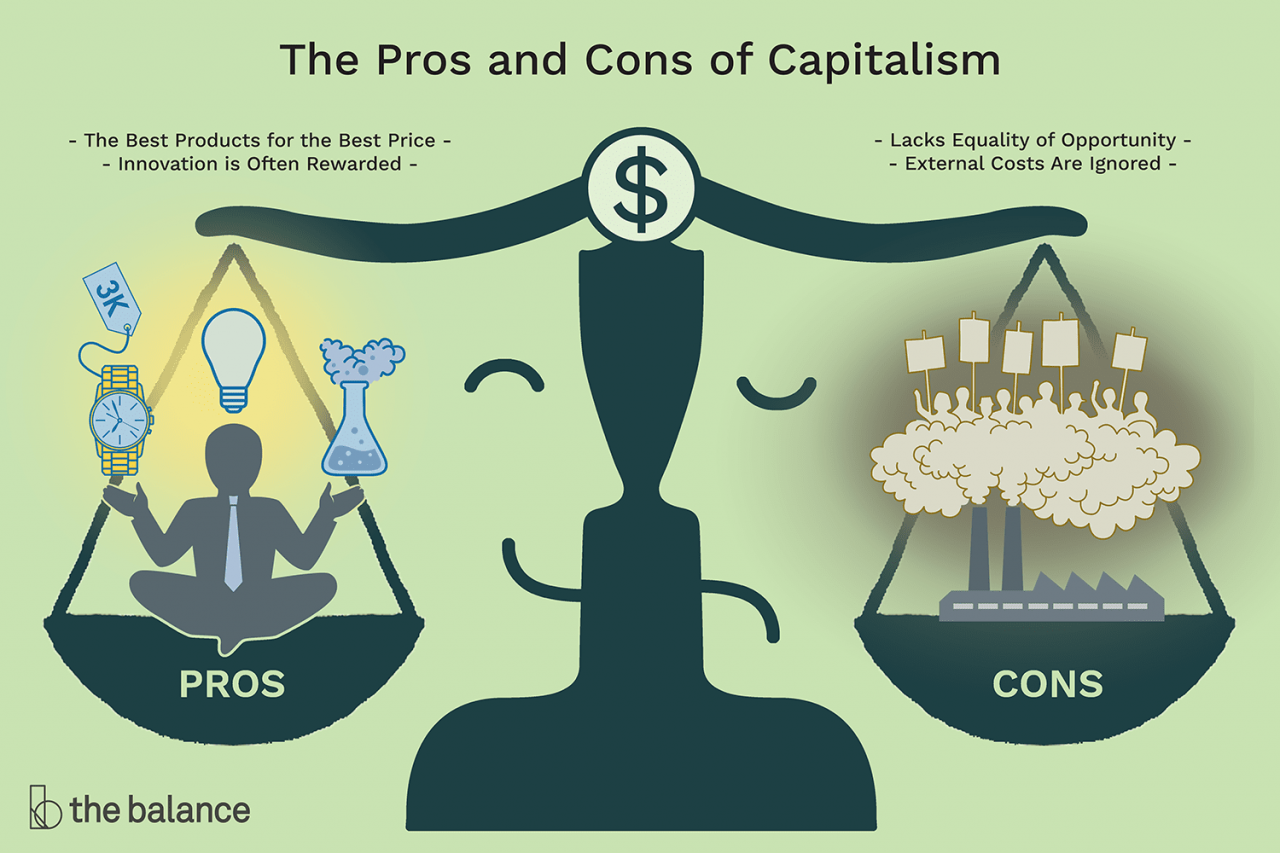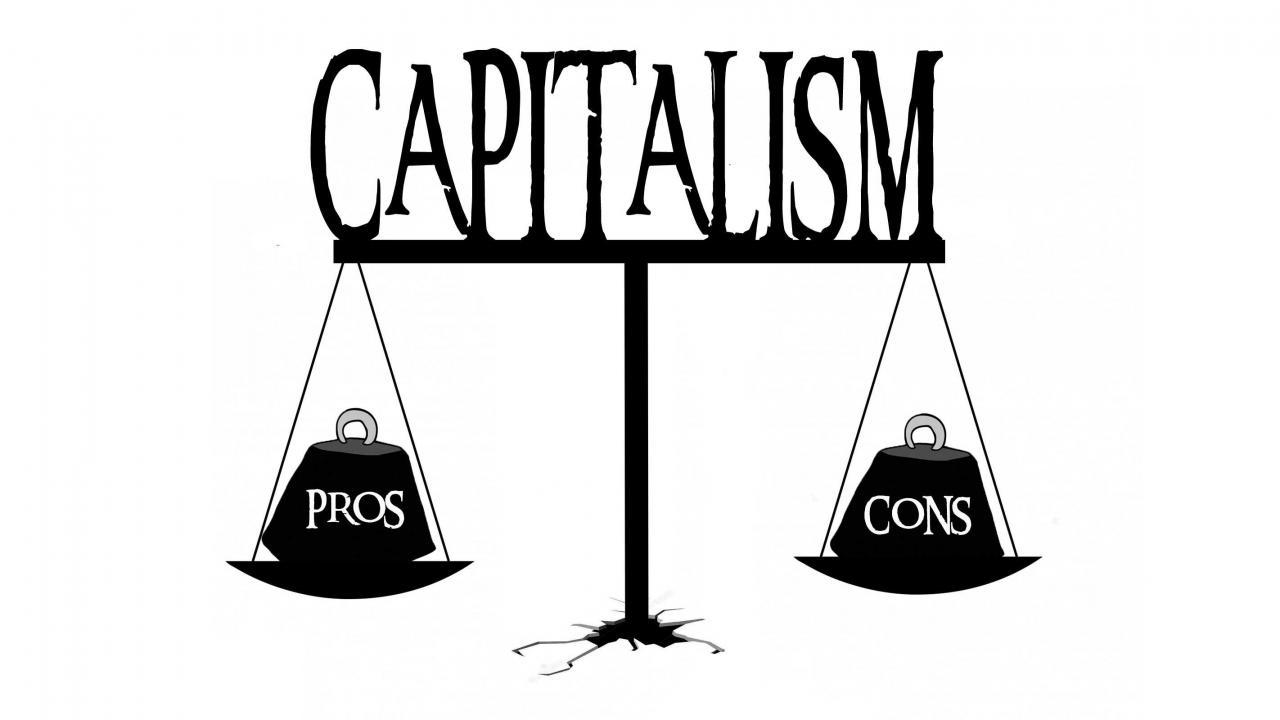In an economic system where individuals own businesses, entrepreneurship flourishes, driving economic growth and innovation. This unique model empowers individuals to shape their economic destiny, fostering a vibrant and dynamic business landscape.
Individual ownership of businesses offers numerous advantages, including greater control over decision-making, potential for higher profits, and the satisfaction of building something from the ground up. However, it also comes with challenges, such as the need for capital, entrepreneurial skills, and navigating legal and regulatory frameworks.
Impact on Economic Growth
Individual ownership of businesses plays a vital role in fostering economic growth. When individuals have the freedom and opportunity to establish and operate their own enterprises, it stimulates innovation, competition, and entrepreneurship.
One of the key ways individual ownership contributes to economic growth is by promoting innovation. Independent business owners often have the flexibility and agility to experiment with new ideas and take calculated risks. This drive for innovation leads to the development of new products, services, and technologies that can benefit consumers and industries alike.
For example, the rise of the personal computer industry in the 1970s and 1980s was largely driven by individual entrepreneurs like Steve Jobs and Bill Gates, who saw the potential for a more user-friendly and accessible computing experience.
In an economic system where individuals own businesses, creating an effective business strategy is crucial for success. Follow 6 steps to create an effective business strategy to define your business goals, analyze the market, identify your target audience, develop a marketing plan, and track your progress.
By implementing these steps, you can create a solid foundation for your business and maximize its potential.
Examples of Successful Individually-Owned Businesses
Throughout history, numerous successful individually-owned businesses have made significant contributions to economic growth and innovation. Here are a few notable examples:
- Apple Inc.:Founded by Steve Jobs and Steve Wozniak in 1976, Apple has grown into one of the most valuable companies in the world. Its innovative products, including the iPhone, iPad, and Mac computer, have revolutionized the technology industry and created countless jobs.
In an economic system where individuals own businesses, ethical decision-making is paramount. As explored in “Above the Bottom Line: An Introduction to Business Ethics” here , business owners must balance profit motives with social responsibility. Understanding the ethical implications of their actions helps ensure the long-term success and reputation of their businesses.
- Microsoft Corporation:Founded by Bill Gates and Paul Allen in 1975, Microsoft is another tech giant that has had a profound impact on economic growth. Its operating systems and software products have become essential tools for businesses and consumers worldwide.
- Amazon.com:Founded by Jeff Bezos in 1994, Amazon has transformed the retail industry through its e-commerce platform. It has created a vast marketplace where businesses and consumers can connect, fostering economic growth and convenience.
Role of Government

The government plays a pivotal role in fostering individual business ownership by establishing policies and implementing programs that encourage entrepreneurship and small business development.
Government support for entrepreneurs and small businesses can take various forms, including financial assistance, tax incentives, regulatory support, and access to resources.
In an economic system where individuals own businesses, it’s essential to establish a strong online presence. By adding an Instagram account to your Meta Business Manager , you can connect with potential customers, showcase your products or services, and drive traffic to your website.
This integration allows you to manage your Instagram account alongside your other business pages, ensuring a cohesive and effective marketing strategy.
Government Policies and Programs
- Small Business Loans and Grants:Government-backed loans and grants provide financial support to entrepreneurs and small businesses, helping them cover start-up costs, equipment purchases, and working capital.
- Tax Incentives:Tax deductions, credits, and exemptions can reduce the tax burden on small businesses, freeing up resources for investment and growth.
- Regulatory Support:Governments can streamline regulations and provide guidance to small businesses, reducing compliance costs and administrative burdens.
- Access to Resources:Government agencies and non-profit organizations offer training, technical assistance, and mentorship programs to help entrepreneurs develop their skills and access essential resources.
Access to Capital
Individual business owners face unique challenges in securing capital to fund their ventures. These challenges include limited access to traditional financing options, such as bank loans, due to a lack of collateral or established credit history.
In an economic system where individuals own businesses, entrepreneurship thrives. These individuals have the freedom to innovate and take risks, driving economic growth. This freedom extends beyond the business realm; entrepreneurs can also explore personal interests. For instance, if you’re wondering can you skype on an android , the answer is yes.
Android devices support Skype, enabling entrepreneurs to stay connected while on the go. This flexibility empowers individuals to pursue their passions while contributing to the economic landscape.
To mitigate these challenges, individual business owners can explore alternative funding sources, such as crowdfunding, angel investors, or venture capitalists. Additionally, they can implement strategies to manage financial risk, such as diversifying their income streams and building up a cash reserve.
Crowdfunding
- Crowdfunding platforms allow individuals to raise funds from a large number of small investors.
- This method can be particularly effective for businesses with a strong online presence and a compelling story to tell.
Angel Investors
- Angel investors are wealthy individuals who invest in early-stage businesses.
- They often provide not only funding but also mentorship and guidance.
Venture Capitalists
- Venture capitalists are professional investors who invest in high-growth potential businesses.
- They typically provide large sums of funding in exchange for an equity stake in the business.
Financial Risk Management
- Individual business owners can manage financial risk by diversifying their income streams.
- This means not relying on a single source of revenue, but rather generating income from multiple sources.
- Additionally, building up a cash reserve can provide a buffer against unexpected financial setbacks.
Entrepreneurial Skills: An Economic System Where Individuals Own Businesses
Entrepreneurial skills are crucial for success in individual business ownership. They enable individuals to identify opportunities, develop innovative solutions, and effectively manage and grow their businesses.
Developing and honing these skills is essential for aspiring entrepreneurs. Here are some key entrepreneurial skills and tips for developing them:
Creativity and Innovation
- Brainstorm ideas regularly and explore different perspectives.
- Conduct market research to identify unmet customer needs.
- Experiment with new products or services and be willing to take risks.
Problem-Solving and Decision-Making
- Identify problems and analyze them thoroughly.
- Consider multiple solutions and evaluate their pros and cons.
- Make informed decisions and be prepared to adjust course as needed.
Leadership and Communication
- Inspire and motivate employees to achieve common goals.
- Communicate effectively with customers, investors, and other stakeholders.
- Build strong relationships and foster a positive work environment.
Financial Management
- Understand basic accounting principles and financial statements.
- Create and manage budgets, track expenses, and forecast revenue.
- Seek professional advice when needed.
Marketing and Sales
- Identify target customers and understand their needs.
- Develop effective marketing campaigns to reach and engage potential customers.
- Negotiate deals and close sales to generate revenue.
Adaptability and Resilience, An economic system where individuals own businesses
- Embrace change and be willing to pivot when necessary.
- Learn from mistakes and setbacks.
- Stay informed about industry trends and best practices.
Business Structures

Individual business owners have several options for structuring their businesses. Each structure has its advantages and disadvantages, which should be carefully considered before making a decision.
The most common business structures for individual owners are sole proprietorships, partnerships, limited liability companies (LLCs), and corporations.
Sole Proprietorship
A sole proprietorship is a business owned and operated by one person. The owner is personally liable for all debts and obligations of the business.
Advantages:
In an economic system where individuals own businesses, there’s a lot of freedom and flexibility. You can set your own hours, choose your own projects, and work from anywhere you want. This can be a great lifestyle for people who value independence and creativity.
However, it can also be challenging to manage all aspects of your business on your own. For example, you may need to learn about marketing, accounting, and customer service. If you’re not comfortable with these tasks, you may want to consider hiring a virtual assistant or other professionals to help you.
Fortunately, there are many resources available online to help you learn about these topics. You can also find support from other entrepreneurs in online forums and communities. And if you’re looking for a way to connect your Android phone to your MacBook, there are a few different options available.
Here’s a guide that can help you get started.
- Easy to establish and operate
- Owner has complete control over the business
- Taxed as a pass-through entity, meaning that the business’s profits and losses are reported on the owner’s personal income tax return
Disadvantages:
- Owner is personally liable for all debts and obligations of the business
- Difficult to raise capital
- Limited growth potential
Legal and Regulatory Framework
Individual business owners must adhere to various legal and regulatory requirements to ensure compliance and avoid potential legal issues.
Business Registration and Licensing
All businesses, regardless of structure, must register with the relevant government agencies. This typically involves obtaining a business license, registering for taxes, and meeting specific industry-specific regulations.
Tax Obligations
Individual business owners are responsible for paying taxes on their business income. The specific tax obligations will vary depending on the business structure and the owner’s tax residency.
Compliance with Labor Laws
Businesses must comply with labor laws, including minimum wage requirements, overtime pay, and employee benefits. Failure to comply can result in fines and legal penalties.
Intellectual Property Protection
Businesses should consider protecting their intellectual property (e.g., trademarks, patents, copyrights) to prevent unauthorized use by competitors.
Environmental Regulations
Businesses must comply with environmental regulations to minimize their impact on the environment. These regulations may include waste disposal, air pollution, and water conservation.
In an economic system where individuals own businesses, they have the freedom to make decisions that can affect their bottom line. One of the most important decisions they can make is whether or not to invest in new technology. For example, if you’re wondering can you take screenshots on an android phone , the answer is yes.
This is a valuable tool that can help you save time and money. By investing in new technology, businesses can improve their efficiency and productivity, which can lead to increased profits.
Insurance
Adequate insurance coverage is crucial for individual business owners to protect against potential risks, such as property damage, liability claims, and business interruption.
In a capitalist system where individuals own businesses, it’s essential to understand how to address correspondence to those businesses. By following proper addressing an envelope to a business etiquette, you ensure that your mail reaches its intended recipient promptly and professionally.
Whether you’re sending invoices, marketing materials, or important documents, addressing envelopes correctly helps maintain a positive and organized image for both the sender and the business receiving the mail.
Staying Informed and Seeking Professional Advice
Business owners should stay informed about legal and regulatory changes that may impact their operations. Seeking professional advice from lawyers and accountants can help ensure compliance and minimize legal risks.
Case Studies
Case studies of successful individual business owners provide valuable insights into the strategies, challenges, and lessons learned that have contributed to their success. These case studies can offer valuable guidance to aspiring entrepreneurs and business owners.
Entrepreneurial Success Stories
- Steve Jobs:Co-founder of Apple, known for his visionary leadership and innovation in the technology industry.
- Oprah Winfrey:Media mogul and philanthropist, who built her empire from humble beginnings through determination and hard work.
- Elon Musk:Founder of Tesla and SpaceX, known for his ambitious projects and disruptive approach to business.
Strategies for Success
Successful individual business owners often employ a combination of strategies to achieve success. These strategies may include:
- Identifying a market need:Identifying an unmet need in the market and developing a product or service that addresses that need.
- Developing a strong business plan:Outlining the business’s goals, strategies, and financial projections.
- Building a strong team:Hiring and retaining a talented team of employees who share the entrepreneur’s vision.
Challenges Faced by Individual Business Owners
Individual business owners often face a range of challenges, including:
- Access to capital:Obtaining financing to start or grow a business can be challenging for individual business owners.
- Competition:Facing competition from larger businesses with more resources and market share.
- Managing risk:Making decisions that balance the potential for growth with the risk of financial loss.
Lessons Learned from Successful Entrepreneurs
Successful entrepreneurs have learned valuable lessons throughout their journeys, including:
- Embrace failure:Learning from mistakes and setbacks is essential for growth and success.
- Stay persistent:Overcoming challenges and staying focused on long-term goals is crucial.
- Adapt to change:Responding to market changes and technological advancements is essential for staying competitive.
Closing Notes

As we delve into this fascinating topic, we will explore the key characteristics of individual business ownership, its impact on economic growth, and the role of government in supporting entrepreneurship. We will also provide practical tips for developing entrepreneurial skills, securing funding, and navigating the legal and regulatory landscape.
FAQ Compilation
What are the benefits of individual business ownership?
Greater control over decision-making, potential for higher profits, and the satisfaction of building something from the ground up.
What are the challenges of individual business ownership?
Need for capital, entrepreneurial skills, and navigating legal and regulatory frameworks.
What is the role of government in supporting individual business ownership?
Providing access to capital, implementing policies that encourage entrepreneurship, and offering training and support programs.